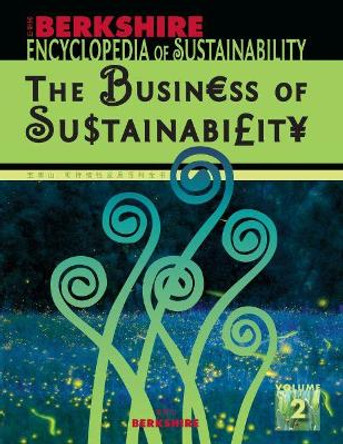Description
Companies know how to meet the demands of shareholder value: years of managerial excellence testify to this achievement. Many also know how to create stakeholder value - through traditional approaches such as CSR and philanthropy which predictably lead to trade-offs and added costs. What remains elusive is discovering is how to meet both shareholder and stakeholder requirements in the core business - without mediocrity and without compromise - creating value for the company that cannot be disentangled from the value it creates for society and the environment. What if sustainability was embedded into the DNA of your organization? How can you incorporate environmental, health and social value into its very core? Many companies, despite their best intentions, "bolt on" sustainability as an afterthought to their core strategies. They trumpet green initiatives and social philanthropy which lie at the margins of the business, with symbolic wins that inadvertently highlight the unsustainability of the rest of their activities.
Today's ecological and social pressures require a different business response - one that existing strategy frameworks fail adequately to address. In Embedded Sustainability, authors Chris Laszlo and Nadya Zhexembayeva explain and predict how companies can better leverage global challenges for enduring profit and sustained growth. They introduce the marquis concept of embedded sustainability: the incorporation of environmental, health, and social value into the heartbeat of the product life-cycle with no trade-off in price or quality - no social or green premium. This book helps readers to comprehend and implement the notion of embedded sustainability. At its best, embedded sustainability is invisible, similar to quality. In addition to delivering socially and environmentally conscious products for consumers, it is capable of considerably motivating employees. Most of all, it enables smart companies to create even more value for both their shareholders and stakeholders.
Embedded Sustainability is a new way of thinking about strategy. And it's vital for every sector of the economy - whether managers realize it or not. "... truly stretches our minds and turns sustainable value into a compelling direction which is within our capability ... both delightful and frightful ... It is a highly intelligent (and intellectual) roadmap of the gearshift in corporate thinking and actions that are needed to transform sustainability bandaids into sustainable business". Elaine Cohen "Laszlo and Zhexembayeva show clearly that the defining characteristic of the successful 21st-century corporation will be its ability to embed sustainability in every fiber of its being. And, even more importantly, embedded sustainability will hold the key to future profit and value creation." Stuart L. Hart
About the Author
Laszlo, Chris; Zhexembayeva, Nadya
Reviews
Although I didn't, in many ways, it makes sense to start reading this book at the penultimate chapter, Chapter 9, entitled "The world in 2041." Now, 2041 is not all that far away, but the description of the fictional young Jake Marstreng attending an interview with "Septad Corp" is as futuristic as the best sci-fi movies, as surreal as the best fantasy productions and as realistic as the best documentaries on National Geographic. It's a future which is so far-fetched as to be a perversion of the authors' imagination and yet so possible as to be just around the corner. Detailed descriptions of the radically changed global economy, sci-fi lifestyles and new technologies are truly exciting: solar cell conversion of light into electricity, PCB destruction using photozymes, Virtual Retinal Display contact lenses, 3-D virtual conferencing, vertical farms using hydroponics and crop stackers powered by methane digestion, vehicles powered by solar photovoltaic thermoelectric generator hybrid systems, construction incorporating zero-energy technologies and hydro botanic water treatment and more. And all this happens after the Water Wars and the Dark Years. All that's missing is Mr Spock (who, in 2014, is probably Indian, Chinese or Brazilian). Reading Chapter 9 helps you make sense of what Embedding Sustainability is all about. It's not another shmoozy look at how companies are "doing well by doing good." It's not another collection of glowing MNE case studies that have more reputational value than sustainability substance. It's not a how-to-succeed-at-sustainability-in-3-days recipe. It is a highly intelligent (and intellectual) roadmap of the gearshift in corporate thinking and actions that are needed to transform sustainability bandaids into sustainable business. Chris Laszlo and Nadya Zhexembayeva do a magnificent job of whetting our appetites for creating sustainable value. They describe the book as organized around "central themes of business strategy and change management, with two bookends." The first "bookend" is about the mega-trends that are driving the new business environment and the last "bookend" is about a future vision of business and some of the key questions we often wrestle with as we move forward on the sustainability journey. The authors shape the mega-trends around three core issues: declining resources, radical transparency and increasing expectations, offering compelling arguments relating to each. For example, bluefin tuna has become so rare that a single adult fish fetched $396,000 at an auction in Tokyo; use of Google Earth to view the plantations where bananas are grown by Dole; the sale of 190,000 organic cotton yoga outfits by Walmart in the first 10 weeks of launch; or Sourcemap.org which exposes environmental impacts of anything manufactured. Now convinced, the heart of this book provides an excellent backdrop for envisaging sustainable value creation. Seven key drivers are discussed: risk mitigation, efficiency opportunity, factor of differentiation, pathway to new markets, protect and enhance the brand, influencing industry standards and driver of radical innovation. However there are many paths to Rome and strategic approaches may differ from company to company. Embedded Sustainabilitythen takes us on a journey of strategy development using three strategic frameworks: Porter's Generic Strategies, Kim and Mauborgne's Blue Ocean Strategy and Clayton Christensen's Disruptive Innovation, showing how all these can have their place in the ways in which companies create superior sustainable value. Finally, even if you are on board so far, there is still much to debate. The final chapter of this book is an articulation of some underlying questions (the authors' "starter-kit of Big Picture questions"):Growth or No growth? Is growth itself sustainable?What is the role of government and the nonprofit sector? Can regulation achieve what voluntary initiative cannot?Stopping the bad or creating the good? Is your agenda bright green or dark green?Having or being? Is a moral awakening imperative?Evolution or revolution? Can we expect a global breakdown and rebuild to occur within a few decades?Restoring or transforming nature? Should we aspire to the preservation of nature in its untouched state or use our technologies to "fix" and "improve" nature?Fear or enlightened self-interest? Are we motivated to change by fear or by positive images of the future? Does inspiration drive us more than the threat of an impending disaster?Embedded Sustainability: The Next Big Competitive Advantage truly stretches our minds and turns sustainable value into a compelling direction which is within our capability, though not without fundamental repositioning of the way we perceive sustainable value and the routes to achieve it. This book is both delightful and frightful. The vision of an accessible sustainable reality created by Chris Laszlo and Nadya Zhexembayeva is delightful.
Book Information
ISBN 9781906093587
Author Chris Laszlo
Format Hardback
Page Count 288
Imprint Greenleaf Publishing
Publisher Taylor & Francis Ltd
Weight(grams) 630g









